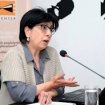“The Role of External Factors in the Karabakh Process - 2018: Mediators, Regional Actors and International Organizations”: Page 5 of 8
replace a full negotiations dialog to resolve the issue.
Rauf Mirkadyrov - I agree with Mr. Mamedov in the sense that it (the organization and implementation of a peace coercion action - Editor) is a lengthy procedure. Moreover, almost all of us have agreed that the war will be short and quick. That is to say, they will not manage to discuss and make a decision. I would like to remind that even during the so-called April war (2016 - Editor.) the issue was even included in the agenda of the UN Security Council regardless of the local significance of these military actions. Secondly, in the conditions of the present geopolitical reality and given the interests of global players, primarily those of Russia and the USA, such a consolidated response is not possible at all. Russia and Iran are not interested in the appearance of non-regional forces in this region. They did not manage to achieve a complete agreement on this issue even in mid 1990s. Theoretically, Russia, Iran and Turkey can promptly react to the situation. Iran will not go for it. It already has more than enough. An attempt of a military intervention will become an appropriate occasion for striking Iran.
Turkey, regardless of its alliance with Azerbaijan, will also hardly introduce its forces into the conflict zone. This will provoke a war between Russia and Turkey. In addition, this is something Turkey does not want. Take a closer look on the map. A large-scale troops deployment is possible across the territories of Iran, Georgia and Armenia. Iran will not agree to this. Deployment of forces across Armenia is an intervention, leading to a war with Russia. Russia will not leave this unanswered, even if Turkey tries to deploy its forces across Georgia. Yet, the most important factor is that Turkey is afraid of a war with Russia. Mind it, Turkey has not yet dared to establish military bases in Azerbaijan.
Alliances with the Participation of Russia, Azerbaijan, Georgia, Turkey, Iran and the Karabakh Conflict
Andrey Areshev - I assume that potential alliances will be situational in nature and will be dictated by the necessity to solve emerging problems, often in the urgent mode. Such is our complicated reality; tactical maneuvering does not give any chance for the formulation of long-term goals and conceptualization of mechanisms for their achievement (and it is a serious question whether this is attainable at all in the conditions of narrowing national jurisdictions in favor of global cross-border players). The potential cooperation between Iran, Azerbaijan and Russia is conditioned by the widely known project of the International North-South Transport Corridor; at the same time, Azerbaijan is also involved in other “latitudinal” energy communications projects, which undoubtedly are of higher significance. Instability in the Middle East is truly expanding towards Iran and the South Caucasus (we have had multiple occasions to write about this), instilling serious apprehensions, also within the context of the Karabakh conflict... The trilateral cooperation among Turkey, Azerbaijan and Georgia may have the most significant impact on the Karabakh conflict, and it just







 +37410 563363
+37410 563363
 ул. Бузанда 1/3, 8-й этаж, Ереван, Армения
ул. Бузанда 1/3, 8-й этаж, Ереван, Армения